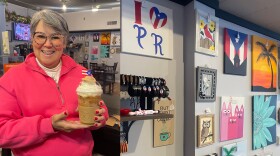Philanthropy has always played a role in American society – from supporting the arts, to education, religious organizations and various nonprofits. And within the philanthropy community, women have played a sometimes-unheralded role.
Joan Marie Johnson is a historian and author of the new book Funding Feminism: Monied Women, Philanthropy, and the Women’s Movement, 1870-1967. Johnson says without the large gifts made by wealthy women of society, progress in areas such as voting rights, education and birth control would have been slower.
"Many of them, despite their privilege, were really motivated by their own experiences of gender discrimination, which is what we see today as well with major donors to women’s causes," she explains.
In the late 19th century there was a major shift in philanthropy — both in the amounts of gifts given and the manner of the transactions according to Johnson. Industrialists were making enormous fortunes in the Gilded Age, but they wanted to do more than just hand over a donation.
"Those reformers really wanted to be much more scientific and efficient and organized and professional about the kind of social reform they were doing," says Johnson. "[And women] saw the kind of power that money could have in the lives of their fathers and their husbands and their brothers, yet they didn't have access to that."
Whether women had fortunes from marriage, inheritance or widowed, they were actively starting to play a bigger role in their finances. Johnson notes that female philanthropists — ranging from giving cents to millions of dollars — were now actively focusing on women-centric causes.
"If they could gain more political rights then that would then elevate women's status in society and allow them to also make gains in economic empowerment and employment opportunities as well as reproductive rights," she explains.
However, the age of big philanthropy did not come without its growing pains. Foundations were just starting to be used as an organizational and monetary tool, which meant that undue influence could often accompany a donation.
"A wealthy woman could use her money to maybe convince male administrators at a university to open their doors to women, but it was another thing when a woman was within a women's organization using her money to advance her own agenda," says Johnson. This caused resentment within the movement not just between the donors and the public activists, but particularly in class and race differences.
She notes that Funding Feminism covers almost 100 years of the women's movement that saw change from the 19th Amendment to the funding of the development of the birth control pill. While we have made progress, there is obviously not true equity yet.
Johnson notes that temperance reformer Frances Willard spoke about progress "as a spiral. That as we move forward it's certainly not a straight line, and that has really been something I've been thinking quite a bit about lately," she says. "We have come a long way from 1900 ... but certainly there is also far to go and we have to protect our rights and really move forward and also be more inclusive."
The Women’s Fund of Greater Milwaukee is working today to shine a light on the role women philanthropists played in earning voting rights for women in this country. Its annual event, titled The Power of Philanthropy, on Nov. 1 will honor present and past philanthropists, as well as host Johnson as the keynote speaker.
"The core issues and systemic change, really trying to affect an attitude or behavior in order for the culture to change is at the core of what the Women's Fund work has been since the beginning in 1985," notes Women's Fund of Greater Milwaukee Executive Director Lisa Attonito. "We felt as a fund that Joan is a perfect person to highlight the value of philanthropy and the power of philanthropy."






